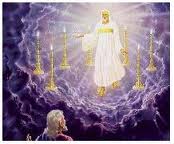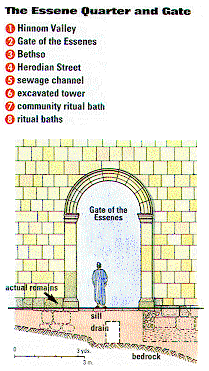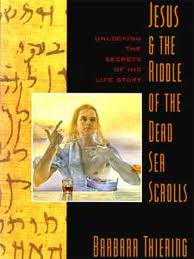|
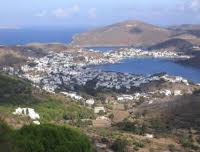
The Isle of Patmos
Having given all these
other guesses and theories due consideration, let's proceed with the most likely
story, the hidden history of the meeting of Jesus himself with the man known in
the Gospels as "John of Zebedee", who is the one generally thought of
as being "John the Apostle" by the long-standing tradition -- people
not knowing much about Eutychus, alias "John Mark" -- who actually
wrote (along with Philip) the "Gospel of John". It
seems this meeting did occur on Patmos, in the Fall of 49 AD, which is 20 years
earlier than the earliest date suggested by the later scholars.
What these
scholars have failed to note is that in the reign of Claudius, the Christians
were expelled from Rome because of a disturbance caused by the Samaritans.
Writes Thiering on page
265 in her Chronology for the year 49 AD.
|
"In late 49 the party of Jesus, Peter, John of Zebedee - Aquila and
Luke ("Christians") are forced by Samaritan influence to
leave Rome. (Cf. Suetonius, Vita Claudii 25:4).
The "Beloved Son" is "killed"
by the keepers of the Vineyard (Mark 12:7-8). They come to
Greece, Patmos and Troas." |
"A Roman historian records that in about AD 49 Jews were expelled from Rome
for "rioting at the instigation of Chrestus". Christians with an
outlook like that of John of Zebedee, as illustrated in his book of
Revelation, were capable of fervent action in expectation of heavenly
support. But Roman authority would not tolerate further trouble from the
Jews. They were driven out, going back to Greece, which in their world
scheme was the eastern limit of the province of Rome."
|

|
"At
first, John of Zebedee came with Jesus to the island of Patmos, off the
coast of Asia Minor. There he wrote the first part of the book of
Revelation, with letters to the seven churches of the province of Asia,
conveying the will of Jesus concerning the different problems, moral and
doctrinal, that were besetting them. The letter to Thyratira, in
which the teaching of "Jezebel" was condemned, may have brought
about the change of doctrine by Lydia that led to her rebaptism at the
time of her remarriage the following year." |
"John wrote that he was on
the island of Patmos "on account of the word of God and the testimony
of Jesus". He was "in the Spirit on the Lord's
day", that is, acting as a presbyter on the Sunday service, when he
heard behind him a loud voice telling him to write what he saw, in a
book. "
| "John was facing the congregation, and Jesus was behind
him in the position of priest. He turned, and saw "in the
midst of the [seven] lamp stands one like the Son of Man".
There were candles on the holy table, in the formation still used by the
Roman church: three on either side running from the centre, with the Pope
in the position of the central light." |
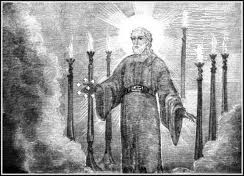 |
"From Patmos they moved to
Philippi, where Jesus' marriage to Lydia took place in March AD 50.
For Paul, who crossed to Europe at this time and renewed his fellowship
with Jesus, the year AD 50 was "the beginning of the gospel"
from which he counted the true form of Christianity."
COMMENT by Dr. Bob Holt, MD.
Dr. Thiering's research
has here provided a proper beginning for our study on the
"Apocalypse", the New Testament Book of Revelation.
But to assume that Aquila the Roman Essene (John of Zebedee) wrote the
whole book, or even wrote what he wrote entirely on the Isle of Patmos, is
far too simplistic an explanation. A beginning was made at turning
pre-existing parts into a book, and indeed the "Letters to the Seven
Churches (2 chapters) may have been written entirely in one sitting here
on Patmos in 49 AD, but the book was periodically added to from time to
time, and I will conclusively show that part of it was written at Masada
about 70 to 74 AD, over 20 years later. And part of the book
was written in India! Perhaps as late as 95 AD!
Besides Aquila and
Jesus, there can be little doubt that other authors had a part in writing
parts of Revelation, including the unknown authors who wrote the little
"play" of Revelation chapter 12 that was used to celebrate
Jesus' Bar Mizveh on Monday, March 1, 6 AD --- over 43 years before Jesus
and Aquila set pen to parchment on the Isle of Patmos.
|
|
